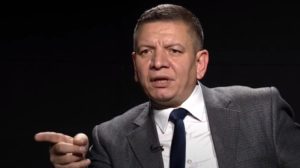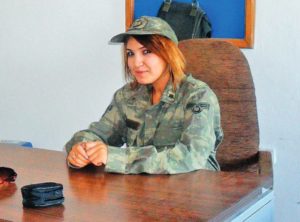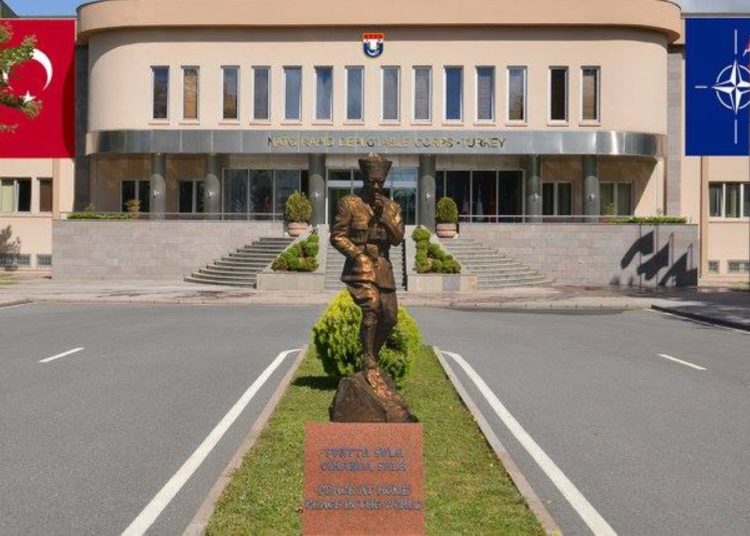Abdullah Bozkurt/Stockholm
An organized crime syndicate in Turkey developed a scheme to spy on US troops who were deployed to the Turkish city of Istanbul as part of the NATO Rapid Deployable Corps (NRDC) Turkey, court documents have revealed.
According to an indictment filed by a Turkish prosecutor in January 2013, an illegal scheme run by former Col. Coşkun Başbuğ, who worked in Turkish military intelligence, was devised to gather information from officers at the 3rd Army Corps, headquartered in Istanbul’s Şişli district and incorporated into the NRDC Turkey unit. The documents seized during the police raids on the homes of two key suspects revealed that the criminal network especially targeted US and NATO officers at the base.
According to the very detailed layout in the indictment, the criminal network was mostly using honey trap schemes in which women were directed to have sex with targets in order to extract information and obtain secret documents. It laid bare a special structure developed for the 3rd Army by the criminal enterprise that had a special focus on NATO officers.
Six Turkish women, all civilians who either worked as contractors for the Turkish army or had some business dealings with the military in the private sector, were listed in the documents as assets working for the criminal syndicate in collecting and passing confidential personal information about the officers deployed at the base. The network also had inside help from a male Turkish officer who originally designed the scheme before handing it over to Başbuğ.

The main asset for the criminal network was a woman named Tuğba Ozangüç, who was working for the information management system at the base. “With this position at the 3rd Army Corps, she can access all kinds of official files of the staff from the system and obtain information about them,” an explanatory note uncovered in the documents indicated.
The second asset was a woman named Ayban Suner, a Turkish national working on US officers’ personnel files in the human resources department. “With her foreign language skills, she acts as a liaison to American officers,” the note said about her.
A banker named Seçil Keskin was also tapped as an asset by the criminal organization, which described her as a person who knew banking and financial information for military personnel as well as the official bank account of the 3rd Army Corps. A woman identified as Özlem Çukurtepe, a web IT expert whose husband worked as an Automated Information Management (Otomatik Bilgi İşlem, OBİ) officer at the War Academy, was listed as a fourth asset. The note said she paired well with Ozangüç, the team leader.
A page from the Turkish indictment that explains how the criminal network targeted NATO officers to obtain classified information. [The names of US officers and Identity data for Turkish nationals have been redacted by Nordic Monitor):
Selin Kongür was a psychologist at the base and knew the psychological profiles of personnel. She collected information about the weaknesses of officers of the 3rd Army Corps. She was described as a good match with a sixth woman identified in the documents only by her first name, Filiz, who appeared to be working in the personnel department.
The seized documents detailed a two-stage modus operandi on how women and their handlers operated. In the first stage, women were directed to organize evening parties and invite officers for the entertainment in order to spot their weaknesses, especially when officers were under the influence of alcohol. In the second step, officers who were convinced to have sex were referred to hotel rooms or special houses where secret surveillance cameras were installed and the sexual intercourse was recorded for purposes of blackmail.

The criminal syndicate appears to have developed a reward system as well. Three women — Ozangüç, Kongür and Keskin — were acknowledged for their outstanding work in collecting information and documents about the US military. A special note stated that they should be rewarded for their exceptional performance. The names of two US officers (Major C.S. and P.M.K., with no rank listed) were mentioned in the documents. However, the wording in the document was not clear as to whether the US officers had leaked information or if the women had collected information without their knowledge. “It came in very handy that the girls speak very good English,” the note added.
Another page from the indictment naming key assets developed by the criminal enterprise to extract information from US officers deployed to a NATO base in Turkey:
The documents were first discovered on a 120 GB Fujitsu hard drive seized from the home of Narin Korkmaz, a prime suspect in the case who was indicted on multiple charges. It was saved on the hard drive under the folder “\\BELGE\3’uncü Kolordu” with a file name of “durumtespit.sunum yapılacak.docx.” The same documents were also found on a flash drive seized from the leader of the criminal network, Bilgin Özkaynak. The assessment of the investigators was that the information collected by the operatives eventually ended up in the hands of the group’s leader.
The flash drive found in Özkaynak’s home was named Coco, a code name for Başbuğ, according to the indictment and wiretaps included in the evidentiary files. It appears the entire scheme was executed by Başbuğ, who had experience from his military career and close connections to Turkish intelligence agency MIT. Başbuğ supervised the scheme at the base through his inside man, Atilla Boğuşlu, an officer at the Land Forces Command and assigned to NRDC Turkey at the time.

In the documents Boğuşlu was described as “a trusted man who passes information through Angelica [an escort woman].” “He feels he has been followed. It needs to be checked out. He got a little spooked. These days, he makes only rare contacts. He brings information from where he can reach out without risking himself. He loves parties,” the note about him said.
The prosecutor demanded life sentences for 11 suspects, including Özkaynak and Korkmaz, on charges of establishing and running an illegal organization; illegally obtaining secret military and personal information; sharing that information with third parties; and endangering state security.
The criminal enterprise had inside help from an officer named Atilla Boğuşlu, who devised the scheme to collect classified information from the base:
The criminal case against the gang members was quashed by President Recep Tayyip Erdoğan in February 2016, and all the suspects were let go. Many returned to their duties in the Turkish military, advancing up the ranks despite their controversial records. As if hushing up the investigation were not enough, the Erdoğan government also punished the prosecutors and police chiefs who exposed the gang and investigated their activities. Most of the investigators who were involved in unmasking the gang were either purged or jailed by the government.












